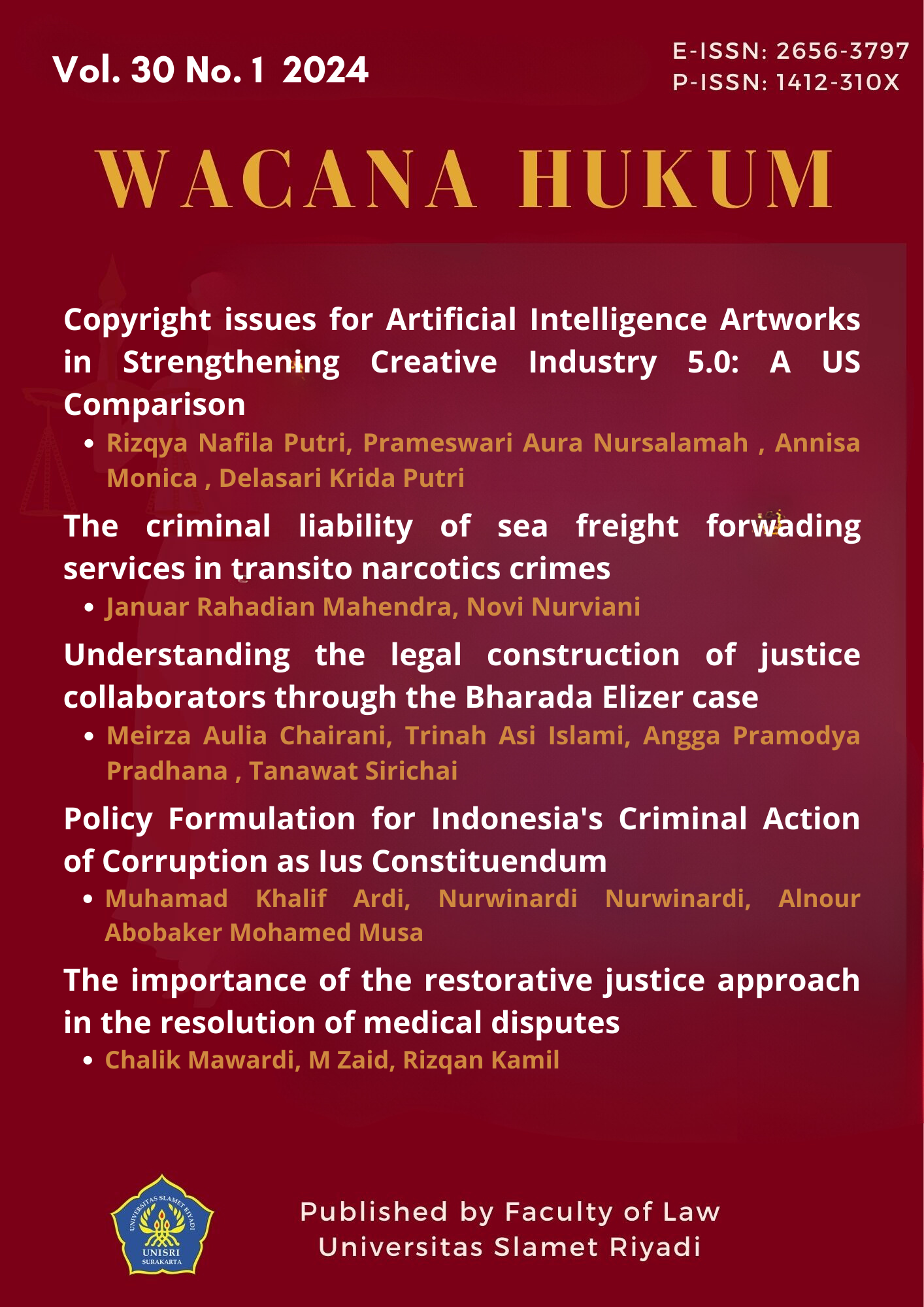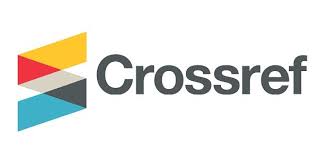Policy Formulation for Indonesia's Criminal Action of Corruption as Ius Constituendum
DOI:
https://doi.org/10.33061/wh.v30i1.10663Keywords:
Corruption Crime, Ius Constituendum, Criminal PolicyAbstract
The objective of this study is to ascertain Bharada Eliezer's stance on Decision Variety: 798/Pid.B/2022/PN.Jkt.Sel, which pertains to the position of Justice Collaborator police officers, as well as the Police Code of Ethics Decision concerning Bharada Eliezer's police status. This study employs a normative juridical research methodology, together with conceptual and statutory techniques. Essentially, when an individual unlawfully ends another person's life, it constitutes a violation of human rights and a denial of the right to life, particularly when the perpetrator is a law enforcement officer who continues to serve in the police force. However, in this particular case, the judge and the responsible official overseeing the KKEP hearing must take into account the defendant's status as a justice collaborator, who is feared by irresponsible parties and at risk of abuse. Ensure that all personnel of the National Police receive guidance to prevent them from engaging in actions that contravene laws, regulations, and the ethical standards of the police profession, which could damage the reputation of the police organization or agency. It is necessary to revise the requirements and guidelines for justice collaborators due to certain criminal offenses that pose a threat to the state and involve exceptional crimes. Justice collaborators play a crucial role in clarifying initially ambiguous criminal offenses.
References
Basuki, Agung, M Zaid, Alnour Abobaker, and Mohamed Musa, ‘Establishing Ecological Justice in the Governance of Land Inventory , Ownership , and Utilisation in Indonesia’, Journal of Law, Environmental and Justice, 18.2 (2023), 137–54 <https://doi.org/10.62264/jlej.v1i2.12>
Bussmann, Kai D, Anja Niemeczek, and Marcel Vockrodt, ‘Company Culture and Prevention of Corruption in Germany, China and Russia’, European Journal of Criminology, 15.3 (2018), 255 – 277 <https://doi.org/10.1177/1477370817731058>
Chen, Yunsen, Limei Che, Dengjin Zheng, and Hong You, ‘Corruption Culture and Accounting Quality’, Journal of Accounting and Public Policy, 39.2 (2020), 106698 <https://doi.org/https://doi.org/10.1016/j.jaccpubpol.2019.106698>
Cheng, Hongming, and L Ling, ‘White Collar Crime and the Criminal Justice System: Government Response to Bank Fraud and Corruption in China’, Journal of Financial Crime, 16.2 (2009), 166 – 179 <https://doi.org/10.1108/13590790910951849>
Deng, Jinting, ‘The National Supervision Commission: A New Anti-Corruption Model in China’, International Journal of Law, Crime and Justice, 52 (2018), 58–73 <https://doi.org/https://doi.org/10.1016/j.ijlcj.2017.09.005>
Goel, Rajeev K, and James W Saunoris, ‘Corrupt Thy Neighbor? New Evidence of Corruption Contagion from Bordering Nations’, Journal of Policy Modeling, 44.3 (2022), 635–52 <https://doi.org/https://doi.org/10.1016/j.jpolmod.2022.05.004>
Gong, Ting, Shiru Wang, and Hui Li, ‘Sentencing Disparities in Corruption Cases in China’, Journal of Contemporary China, 28.116 (2019), 245 – 259 <https://doi.org/10.1080/10670564.2018.1511395>
Hidayat, Shubhan Noor, Lego Karjoko, and Sapto Hermawan, ‘Discourse on Legal Expression in Arrangements of Corruption Eradication in Indonesia’, JOURNAL of INDONESIAN LEGAL STUDIES, 5.2 (2020), 391–418 <https://doi.org/10.15294/jils.v5i2.40670>
Huang, Chenghao, Zhi Jin, Siyang Tian, and Eliza Wu, ‘The Real Effects of Corruption on M&A Flows: Evidence from China’s Anti-Corruption Campaign’, Journal of Banking & Finance, 150 (2023), 106815 <https://doi.org/https://doi.org/10.1016/j.jbankfin.2023.106815>
Khalif, Muhammad, FX Hastowo Broto Laksito, and Andriamalala Laurent, ‘Role and Position of Indonesian Medical Disciplinary Honour Council : Fair Medical Dispute Resolution’, Journal of Law, Environmental and Justice, 1.3 (2023), 185–201 <https://doi.org/10.62264/jlej.v1i3.15>
Levi, Michael, and Fangmin Ruan, ‘Corruption Legislation and Socio-Economic Change in the People’s Republic of China’, Journal of Financial Crime, 4.2 (1996), 116 – 128 <https://doi.org/10.1108/eb025766>
Li, Ling, ‘Performing Bribery in China: Guanxipractice, Corruption with a Human Face’, Journal of Contemporary China, 20.68 (2011), 1 – 20 <https://doi.org/10.1080/10670564.2011.520841>
Locatelli, Giorgio, Giacomo Mariani, Tristano Sainati, and Marco Greco, ‘Corruption in Public Projects and Megaprojects: There Is an Elephant in the Room!’, International Journal of Project Management, 35.3 (2017), 252–68 <https://doi.org/https://doi.org/10.1016/j.ijproman.2016.09.010>
Mahmood, Mabroor, ‘Corruption in Civil Administration: Causes and Cures’, Humanomics, 21.3 (2005), 62 – 84 <https://doi.org/10.1108/eb018905>
Márquez, Daniel, ‘Mexican Administrative Law Against Corruption: Scope and Future’, Mexican Law Review, 8.1 (2015), 75–100 <https://doi.org/10.1016/j.mexlaw.2015.12.004>
Muhamad, Nurisyal, and Norhaninah A. Gani, ‘A Decade of Corruption Studies in Malaysia’, Journal of Financial Crime, 27.2 (2020), 423 – 436 <https://doi.org/10.1108/JFC-07-2019-0099>
Pan, Zimeng, ‘Culture-Specific Conceptualisations Relating to Corruption in China English’, Lingua, 245 (2020), 102948 <https://doi.org/https://doi.org/10.1016/j.lingua.2020.102948>
Prakasa, Satria Unggul Wicaksana, ‘Garuda Indonesia-Rolls Royce Corruption, Transnational Crime, and Eradication Measures’, Lentera Hukum, 6.3 (2019), 413–30 <https://doi.org/10.19184/ejlh.v6i3.14112>
Rini, Nicken Sarwo, ‘Penyalahgunaan Kewenangan Administrasi Dalam Undang Undang Tindak Pidana Korupsi’, Jurnal Penelitian Hukum De Jure, 18.2 (2018), 257 <https://doi.org/10.30641/dejure.2018.v18.257-274>
ROSE-ACKERMAN, Susan, ‘Corruption and the Criminal Law Legalization and Criminalization’, Forum on Crime and Society, 2.1 (2002), 20
Salsabila, Salsabila, and Slamet Tri Wahyudi, ‘Peran Kejaksaan Dalam Penyelesaian Perkara Tindak Pidana Korupsi Menggunakan Pendekatan Restorative Justice’, Masalah-Masalah Hukum, 51.1 (2022), 61–70 <https://doi.org/10.14710/mmh.51.1.2022.61-70>
Saputra, Rian, M Zaid, and Devi Triasari, ‘Executability of the Constitutional Court ’ s Formal Testing Decision : Indonesia ’ s Omnibus Law Review’, Journal of Law, Environmental and Justice, 1.3 (2023), 244–58 <https://doi.org/10.62264/jlej.v1i3.18>
Setiawan, Muhammad Arif, and Mahrus Ali, ‘When Double Intention Ignored: A Study of Corruption Judicial Decisions’, Jurnal Hukum Ius Quia Iustum, 28.3 (2021), 459–80 <https://doi.org/10.20885/iustum.vol28.iss3.art1>
Siddiquee, Noore Alam, ‘Combating Corruption and Managing Integrity in Malaysia: A Critical Overview of Recent Strategies and Initiatives’, Public Organization Review, 10.2 (2010), 153–71 <https://doi.org/10.1007/s11115-009-0102-y>
Sudarti, Elly, and Sahuri Lasmadi, ‘Harmonisasi Sistem Pemidanaan Dan Tujuan Pemidanaan Pada Tindak Pidana Korupsi Suap’, Pandecta, 16.1 (2021), 173–85
Wibowo, Seno, and Ratna Nurhaya, ‘Perbedaan Pandangan Ajaran Sifat Melawan Hukum Materiil Tindak Pidana Korupsi’, Padjadjaran Jurnal Ilmu Hukum, 2.2 (2015), 351–69
Wu, Haitao, Yufeng Xia, Xiaodong Yang, Yu Hao, and Siyu Ren, ‘Does Environmental Pollution Promote China’s Crime Rate? A New Perspective through Government Official Corruption’, Structural Change and Economic Dynamics, 57 (2021), 292–307 <https://doi.org/https://doi.org/10.1016/j.strueco.2021.04.006>
Zhang, Peng, ‘Anti-Corruption Campaign, Political Connections, and Court Bias: Evidence from Chinese Corporate Lawsuits’, Journal of Public Economics, 222 (2023), 104861 <https://doi.org/https://doi.org/10.1016/j.jpubeco.2023.104861>
Zhou, Kuo, Haotian Luo, Diyu Ye, and Yunqing Tao, ‘The Power of Anti-Corruption in Environmental Innovation: Evidence from a Quasi-Natural Experiment in China’, Technological Forecasting and Social Change, 182 (2022), 121831 <https://doi.org/https://doi.org/10.1016/j.techfore.2022.121831>
Downloads
Published
How to Cite
Issue
Section
License
Copyright (c) 2024 Muhamad Khalif Ardi, Nurwinardi Nurwinardi, Alnour Abobaker Mohamed Musa

This work is licensed under a Creative Commons Attribution-ShareAlike 4.0 International License.
Authors who publish with this journal agree to the following terms:
- Copyright on any article is retained by the author(s).
- The author grants the journal, the right of first publication with the work simultaneously licensed under a Creative Commons Attribution License that allows others to share the work with an acknowledgment of the work’s authorship and initial publication in this journal.
- Authors are able to enter into separate, additional contractual arrangements for the non-exclusive distribution of the journal’s published version of the work (e.g., post it to an institutional repository or publish it in a book), with an acknowledgment of its initial publication in this journal.
- Authors are permitted and encouraged to post their work online (e.g., in institutional repositories or on their website) prior to and during the submission process, as it can lead to productive exchanges, as well as earlier and greater citation of published work.
- The article and any associated published material is distributed under the Creative Commons Attribution-ShareAlike 4.0 International License

















.png)


